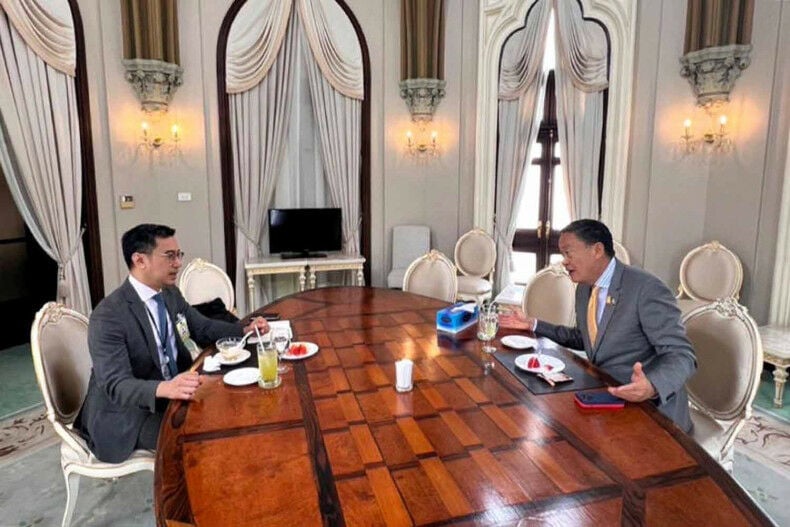PM Srettha in talks with BoT chief over handout scheme

Thailand Prime Minister Srettha Thavisin has yet to address Bank of Thailand (BoT) Governor Sethaput Suthiwartnarueput’s staunch opposition to the government’s colossal 500-billion-baht handout scheme.
Acknowledging the brewing conflict, PM Srettha admitted he and the central bank governor held divergent views, necessitating urgent discussions.
Governor Sethaput, in a candid Bloomberg interview, criticised the sweeping economic stimulus, suggesting it was excessive and unnecessary. The government’s ambitious plan involves distributing 10,000 baht in digital currency to approximately 50 million Thai citizens later this year.
In stark contrast, Sethaput proposes restricting the handout to the nation’s 15 million welfare cardholders, arguing for a more targeted approach.
Defending the initiative, PM Srettha asserted that the digital handout would invigorate regional economies by mandating local expenditure.
“When the project launch date is clear, I believe industries and SMEs will accelerate production to meet this surge in purchasing power. This will stimulate the economy.”
However, the plan faces fierce opposition in Parliament. Critics warn of the significant risk of excessive borrowing, spotlighting the digital wallet programme as a major fiscal concern during the heated debate on the 2025 budget yesterday.
Addressing concerns about the potential impact on government debt repayment, the 62 year old Thai premier emphasised that the short-term economic boost would lay the groundwork for broader stimulus policies. These initiatives aim to attract multinational investment, create employment, and drive industrial upgrades, ultimately boosting GDP and enabling the government to fulfil its financial obligations, reported Bangkok Post.
ORIGINAL STORY: BoT opposes cash handout scheme, urges help for those in need
The Bank of Thailand (BoT) firmly opposes the digital wallet cash handout initiative proposing a 500 billion baht cash distribution to nearly all adult citizens to boost consumption, emphasising that it would be more beneficial to directly assist those in need.
Private consumption is expected to grow by about 4% this year following a record 7% increase last year. However, BoT Governor Sethaput Suthiwartnarueput stated there is no necessity for a broad-based stimulation of demand.
Sethaput suggested the digital wallet scheme, currently promising 10,000 baht to each of the 50 million Thai citizens aged 16 and older, should be limited to the 15 million welfare cardholders.
His remarks align with the BoT’s previously stated views. However, the timing is likely to strain government relations further, which are already tense over the central bank’s monetary policy and inflation targets.
Prime Minister Srettha Thavisin’s administration has encountered numerous funding questions and rollout delays for the digital wallet scheme.
The Bangkok-born PM has largely ignored opposition to the programme, promoting it as a means to revive Thailand’s economy from prolonged sluggish growth, meanwhile, Sethaput still questions the motives behind the scheme.
No need
“If you want to do the scheme, it is better to do it in a targeted way and also a smaller way… we don’t see the need to try to stimulate consumption across the board.”
Despite a boom in private consumption driven by tourism recovery, Sethaput pointed out that vulnerable and lower-income households continue to suffer from the pandemic’s impact, requiring targeted support.
Limiting the digital wallet to welfare cardholders, those earning below a certain income level and eligible for various state subsidies would be a more responsible move.
The digital wallet, a key election promise of the ruling Pheu Thai party, has faced controversy over the government’s fluctuating financing strategy. Initially, the plan aimed to cover approximately 55 million Thais using the state budget. However, Srettha’s Cabinet later decided to exclude affluent Thais and finance it through one-off borrowing.
Potential legal challenges and warnings from the country’s anti-graft agency have forced the government to reconsider its funding options. The Thai premier has committed to distributing the cash in the final quarter of this year, although funding uncertainties persist.
As the banking regulator, the BoT has advised the government to ensure that borrowing 172 billion baht from the Bank for Agriculture and Agricultural Cooperatives (BAAC) to fund the digital wallet does not compromise the lender’s safety and liquidity.
Sethaput highlighted significant uncertainties surrounding the digital wallet, noting that the BoT’s growth forecasts for this year and the next, at 2.6% and 3% respectively, do not factor in the programme’s impact.
He assured that Thailand’s economic growth would return to its potential of 3% even without the cash handout, indicating that the monetary policy path would remain unchanged if the programme failed to materialise. reported Bangkok Post.
Latest Thailand News
Follow The Thaiger on Google News:


























